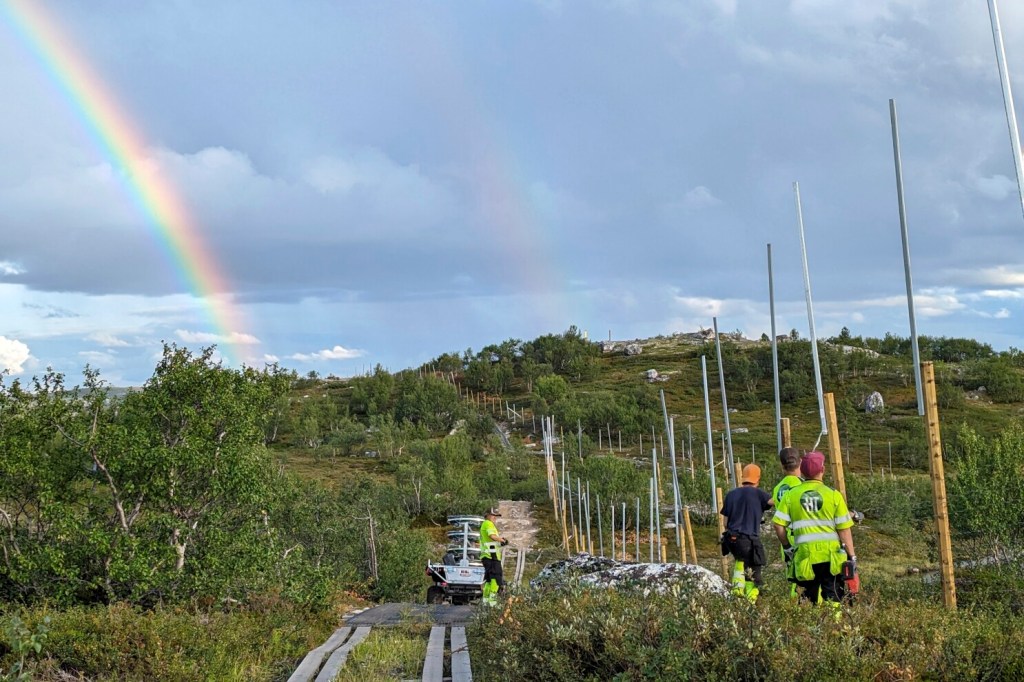News of the weird: Norway rebuilding reindeer fence to stop animals’ costly strolls into Russia
Published 9:59 am Sunday, August 27, 2023

- People work to build a new fence along the border with Russia, next to Storskog, Norway, Wednesday Aug. 23, 2023. Norway is rebuilding a section of fence in the Arctic along its border with Russia to contain wandering reindeer, Norwegian officials said, adding 42 animals have crossed into its eastern neighbor in a costly stroll this year.
COPENHAGEN, Denmark — Norway is rebuilding a dilapidated reindeer fence along its border with Russia in the Arctic to stop the animals from wandering into the neighboring country — costly strolls for which Oslo has to compensate Moscow over loss of grassland.
Norwegian officials said Thursday, Aug. 24, that so far this year, 42 reindeer have crossed into Russia seeking better pastures and grazing land.
The reindeer barrier along the Norway-Russia border spans 93 miles and dates back to 1954. The Norwegian Agriculture Agency said a stretch of about 4 miles between the Norwegian towns of Hamborgvatnet and Storskog would be replaced.
The construction, with a price tag of $348,000, is to be completed by Oct. 1, the agency said.
The work is a challenge, however, as the workers have to stay on the Norwegian side of the border “at all times” during construction, “which makes the work extra demanding,” said Magnar Evertsen of the agency. If a worker crossed into Russian territory, without a Russian visa, that would amount to illegal entry.
The reindeer crossings bring on a lot of additional bureaucracy. Russia has sent two compensation claims, the agency said.
One claim is for nearly $4,700 per reindeer that crossed into Russia to graze in the sprawling Pasvik Zapovednik natural reserve in the Russian Murmansk region. The other claim is asking for a lump sum of nearly $4.4 million in total for the days the animals grazed in the park, which consists mostly of lakes, rivers, forests and marshland.
The agency said that of the 42 animals that entered Russia this year, 40 have been brought back to Norway and the remaining two are expected to come back soon.
The returned animals have since been slaughtered out of fear that they may wander back to Russia, Evertsen said. The Norwegian Food Safety Authority may demand the carcasses be destroyed for safety reasons, the government body said in a statement.
The reindeer are herded by the Indigenous Sami people in central and Arctic Norway. Formerly known as the Lapps, the Sami are believed to have originated in Central Asia and settled with their reindeer herds in Arctic Europe around 9,000 years ago.
They traditionally live in Lapland, which stretches from northern parts of Norway through Sweden and Finland to Russia. Across the Arctic region, the majority live on the Norwegian side of the border.
From tarantulas to tigers, the animals at London Zoo step onto the scales for their annual weigh-in
LONDON — Staff at London Zoo got the measure of giant gorillas, plump penguins and skinny stick insects at the zoo’s annual animal weigh-in on Thursday, Aug. 24.
Zookeepers tempted squirrel monkeys onto scales with treats, totted up tarantulas and used a curry-scented measuring stick to coax Sumatran tigers to stretch out.
Staff at the zoo, which is home to some 14,000 animals, will take several days to weigh and measure every mammal, bird, reptile, fish and invertebrate in its care. The results go into a database that is shared with zoos around the world.
“We record the vital statistics of every animal at the zoo — from the tallest giraffe to the tiniest tadpole,” said Angela Ryan, the facility’s head of zoological operations.
Ryan said an animal’s weight is vital information that can reveal whether creatures are healthy, and even which are pregnant.
“We have critically endangered animals here,” she said. “It’s absolutely vital that we are managing them, managing their health, that we’re breeding them and breeding them well and we’re having healthy offspring that can breed on again.”
Thief steals former governor’s SUV as he hosts a radio show
FARGO, N.D. — Former North Dakota Gov. Ed Schafer learned a lesson about his car keys after his vehicle was stolen as he hosted a Fargo radio show.
Schafer was guest hosting KFGO’s “News and Views” program Friday, Aug. 25, when police called the station to ask if he owned a 2020 GMC Yukon, the station reported.
It turns out that the SUV had been stolen out of the station’s parking lot. The thief apparently drove it to a probation office and surrendered to authorities, Schafer said.
The vehicle has a push-button start feature and requires a key fob to be in the vehicle before it can be operated. But Schafer had left a spare fob inside, enabling the thief to start it up and drive off.
The former governor and U.S. agriculture secretary says he’s been warned about being more careful.
“My wife for 31 years has said, ‘Why don’t you lock your car?’” Schafer said.






